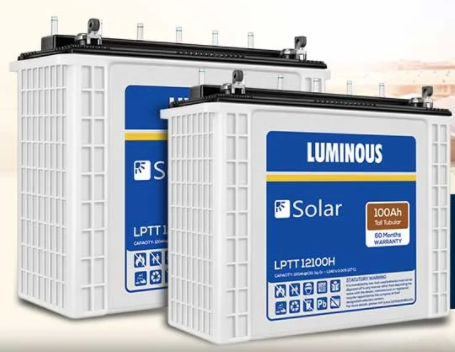A solar battery is a storage device used for storing the excess energy produced by a solar system. The panels in a solar system absorb solar energy and convert it to electricity, which is then sent to your home through the inverter. A battery allows you to store energy produced by your panels and use it later, such as when your panels are no longer generating energy. Solar battery prices and sizes vary from model to model, depending upon their capacity.

Image Courtesy:Luminous
Why Do You Need Solar Batteries?
You can store the extra energy that the solar panels generate at home when you add a solar battery as part of your home solar energy system. Solar batteries allow you to get the most out of the electricity produced by your solar panels on a daily basis. You can use the solar energy you’ve saved when you need more power than your solar panels generate (later in the day or at night).
You should consider the below-mentioned points before investing in a solar battery:
-
Life of the Battery
A battery’s lifetime ranges from five to fifteen years, but it is expected to rise dramatically over time to keep up with the growth of solar panels. The batteries have extended warranty and guarantee periods, so make sure you pick the manufacturer that gives you the best solar battery price with good after-sale service.
-
Storage Capacity of the Battery
The storage capability should be adequate to meet your consumption demands. The storage device should be large enough to provide solar power to a household during the night too. Unnecessary additional costs are typically the product of a poorly measured battery device. If the storage system is too limited, there will be insufficient energy to meet your needs. The solar battery price of a bigger battery might be high, but if that is what your house requires, you should not hesitate to invest in one.
-
Knowledge of the Depth of Discharge (DOD)
The DoD assesses a battery’s usability in relation to its overall size. If a battery has a 100% DoD, that ensures you can use the entire battery storage capacity (for example, 150Ah) to power your house. When a battery has a 94 per cent DoD, it means you can use up to 94 per cent of its power (e.g., for a 150Ah battery, you can use down to 141Ah before the battery needs to charge again). Higher the DoD higher will be the solar battery price.
-
Understanding the Difference Between Battery Efficiency and Total Efficiency
During the storage phase, conversion losses occur, which means that some of the energy is transformed into heat. The overall efficiency of a system means how much of the energy contained in the system can be used. The total efficiency is determined by the entire storage system, not just the battery. The complete performance is normally lower than the battery’s own efficiency due to conversion losses, and most vendors do not report it. Solar battery prices vary depending upon the battery’s efficiency and capacity.
Comparatively, solar battery prices are less than a diesel generator depending upon the capacity and also provide backup power without any greenhouse gas emissions. With solar systems along with battery backup, your home will use the solar energy you’ve saved in the battery whenever the grid goes down. Reputed brands like Luminous provide durable solar batteries with amazing after-sale service and an extended warranty.
Visit a nearby store or check out their website and explore more.
